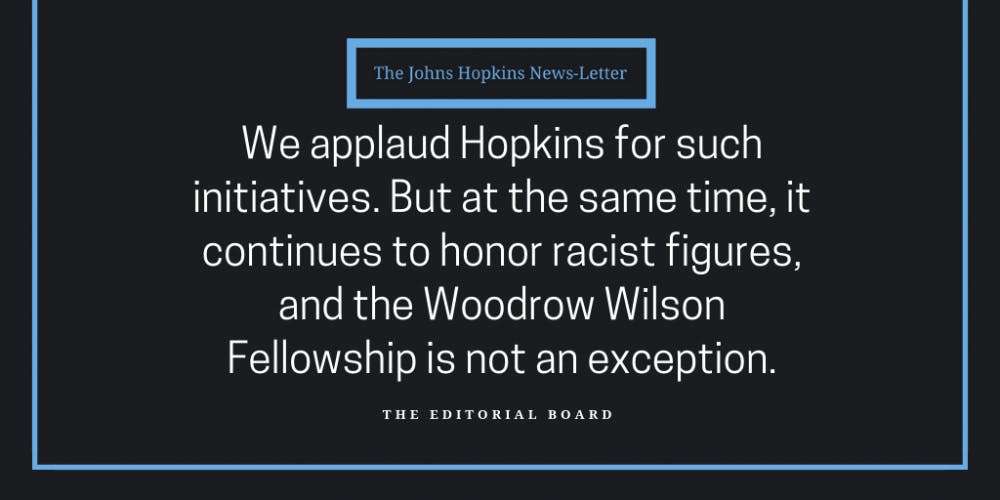Last Thursday, Woodrow Wilson fellows presented a culmination of their four years of research.
The prestigious fellowship, which provides selected applicants up to $10,000 over four years, has given students valuable opportunities to pursue independent research. Yet the fellowship’s namesake concerns us. Woodrow Wilson — a Hopkins alum and the 28th president of the U.S. — was also a proud white supremacist.
As president, Wilson supported and actively enforced the segregation of the White House and the U.S. Army. He openly opposed new freedoms granted to black Americans during the post-Civil War Reconstruction era. At the White House, he screened The Birth of a Nation, a film infamous for glorifying the Ku Klux Klan.
We believe that the Woodrow Wilson Fellowship should be renamed to reflect the University’s current values. Some may argue that it is just a name. But we believe the people that we choose to honor speaks volumes about our values as an institution.
Two and a half years ago, Professor Nathan Connolly submitted a motion that called for the University to rename the fellowship. The Homewood Faculty Assembly supported Connolly’s motion with a 48-3 vote and one abstention. Subsequently, 38 Woodrow Wilson fellows signed a letter urging the University to rename the fellowship. When will the University act?
Colleges across the country have been renaming buildings and removing Confederate statues. The University of San Francisco’s Phelan Hall, for example, was named after James Duval Phelan, a former mayor of the city who actively tried to restrict Chinese and Japanese immigration and ran a political campaign with the slogan “Keep California White.” In May 2017, the University of San Francisco renamed Phelan Hall to honor Burl A. Toler, an alum who was the first black on-field NFL referee.
Calhoun College was one of Yale University’s residential colleges, named after John C. Calhoun, a prominent supporter of slavery. After 86 years under that name, Yale chose to rename Calhoun College in 2017 to instead honor computer scientist Grace Hopper.
We acknowledge that Hopkins has tried to confront its racist past. Homewood Museum, for instance, has recently undergone significant changes. After decades of highlighting the lives of the wealthy Carroll family, the museum received funding in 2016 to research enslaved people who lived on the site. Now, in 2019, Homewood’s tours confront the racism of the Carroll family by focusing on the Ross and Conner families, who were enslaved by the Carrolls.
We applaud Hopkins for such initiatives. But at the same time, it continues to honor racist figures, and the Woodrow Wilson Fellowship is not an exception. Wilson’s name is engraved over the door of Wilson house in AMR I and beneath his bust at Mason Hall. During his time at Hopkins, Wilson studied under Herbert Baxter Adams, a historian who perpetuated white supremacist views. Yet Hopkins continues to honor him with a professorship position and Adams house in AMR II.
We understand that the Woodrow Wilson fellowship was named during a different time. We acknowledge that Wilson was our president and made important contributions to our country and its history. He helped create the Federal Reserve and the Federal Trade Commission. He was an important influence on presidents like Franklin D. Roosevelt. He opposed imperialism and called for national self-determination, inspiring independence movements abroad. But he was also a racist. A fellowship that lets students “dig deeper into the issues that matter most to them” should not openly honor a man whose ideas were backward even for his time.
There are so many other former Hopkins students that we can honor. Why not rename the fellowship after environmental activist and scientist Rachel Carson, a Hopkins alum and the author of the influential environmental science book Silent Spring? Or why not rename the fellowship after Kelly Miller, an African American educator and mathematician and the first black student admitted to Hopkins?
The public figures Hopkins chooses to honor are a reflection of the sort of institution it wants to be. The University can continue to overlook Wilson’s racism by giving out Woodrow Wilson Fellowships. Or it can choose to rename the fellowship and, in doing so, acknowledge the contributions of people that history too often ignores, like women and people of color. Hopkins has honored Wilson long enough. It is time for us to renounce him.
Morgan Ome was not involved in the writing or editing of this editorial.

















